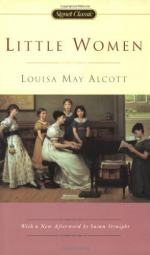“I have none.”
“I forgot young ladies in America go to school more than with us. Very fine schools they are, too, Papa says. You go to a private one, I suppose?”
“I don’t go at all. I am a governess myself.”
“Oh, indeed!” said Miss Kate, but she might as well have said, “Dear me, how dreadful!” for her tone implied it, and something in her face made Meg color, and wish she had not been so frank.
Mr. Brooke looked up and said quickly, “Young ladies in America love independence as much as their ancestors did, and are admired and respected for supporting themselves.”
“Oh, yes, of course it’s very nice and proper in them to do so. We have many most respectable and worthy young women who do the same and are employed by the nobility, because, being the daughters of gentlemen, they are both well bred and accomplished, you know,” said Miss Kate in a patronizing tone that hurt Meg’s pride, and made her work seem not only more distasteful, but degrading.
“Did the German song suit, Miss March?” inquired Mr. Brooke, breaking an awkward pause.
“Oh, yes! It was very sweet, and I’m much obliged to whoever translated it for me.” And Meg’s downcast face brightened as she spoke.
“Don’t you read German?” asked Miss Kate with a look of surprise.
“Not very well. My father, who taught me, is away, and I don’t get on very fast alone, for I’ve no one to correct my pronunciation.”
“Try a little now. Here is Schiller’s Mary Stuart and a tutor who loves to teach.” And Mr. Brooke laid his book on her lap with an inviting smile.
“It’s so hard I’m afraid to try,” said Meg, grateful, but bashful in the presence of the accomplished young lady beside her.
“I’ll read a bit to encourage you.” And Miss Kate read one of the most beautiful passages in a perfectly correct but perfectly expressionless manner.
Mr. Brooke made no comment as she returned the book to Meg, who said innocently, “I thought it was poetry.”
“Some of it is. Try this passage.”
There was a queer smile about Mr. Brooke’s mouth as he opened at poor Mary’s lament.
Meg obediently following the long grass-blade which her new tutor used to point with, read slowly and timidly, unconsciously making poetry of the hard words by the soft intonation of her musical voice. Down the page went the green guide, and presently, forgetting her listener in the beauty of the sad scene, Meg read as if alone, giving a little touch of tragedy to the words of the unhappy queen. If she had seen the brown eyes then, she would have stopped short, but she never looked up, and the lesson was not spoiled for her.
“Very well indeed!” said Mr. Brooke, as she paused, quite ignoring her many mistakes, and looking as if he did indeed love to teach.




